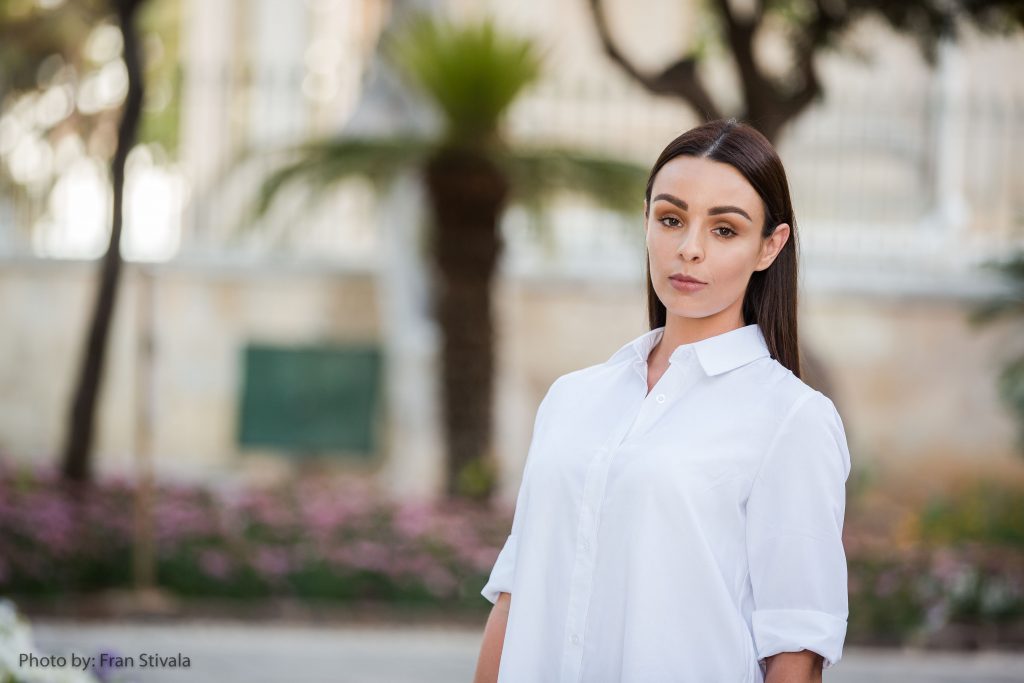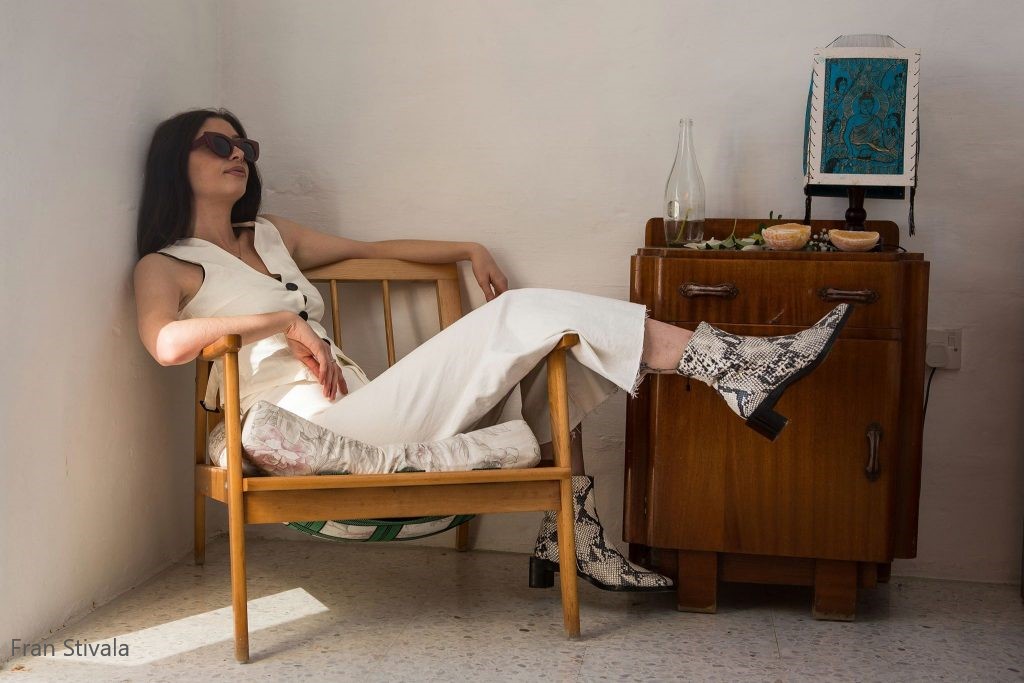
As a newly graduated Gestalt Psychotherapist, Sophie caught our attention because she portrays the modern Maltese woman; confident, influential, inspirational, bright, independent and in the words of Annie Lennox “doing it for herself”.
We caught up with Gestalt Psychotherapist Sophie Bonello Du Puis to find out more about her.
Tell us a bit about yourself – how old are you? what are your aspirations, and what are you passionate about?
I am 27 years old and have always aspired to working in the field of psychotherapy. The dream is to open a private clinic which I can call my own, a space which promotes safety, support, comfort, and tranquility for those seeking help. I would also like there to be a couple of extra rooms which will allow therapists in training or those just starting off, to get off their feet by providing them with a space to practice – something which I found a bit difficult starting off.
I am extremely passionate about animals. I am an animal lover and even have a small dog of my own who is my pride and joy. Therefore, I support animal rights and try my best to donate whenever I can to animal shelters who need help. I am also passionate about fitness and even more recently healthy eating habits. I can’t say that I am a fitness guru and exercise religiously, however I do believe in having a balance – eating lots of fruit and veg, but also indulging in a few of my favourite dishes every now and again – especially pasta!
Exercise for me is extremely important to fit into my routine. I find that when I work out, that time is dedicated to me and me alone – I can unwind and forget about all the stressors in life. It allows me to focus on my wellbeing and to release any negative energy that would be building inside. Self-care!
Who were your role models growing up, was there a particular person, either that you were close to or a famous person that inspired you?
Growing up I was a complete daddy’s girl. I always wanted to play and spend time with my dad. He manages his own business and that really inspired me to eventually work for myself and be independent. The time he invested in us growing up and the love he has for us always pushed me to, not only find those qualities in a partner of my own, but to also embody those values with others and a family of my own one day.
My relationship with my mother strengthened as I grew older. I consider her as one of my best friends. She taught me to be strong and driven in life, and to not allow myself to be financially dependent on a man or anyone else for that matter. My mum always pushed me to work hard and to never give up, (sometimes testing me along the way), but I will always be grateful for it. I learned that not everything in life will go my way, and I may not succeed at first, but with a little bit of a push, I can overcome any obstacle in my path.
Then there was my therapist/supervisor Mariella Dimech. I would say that in the field of Gestalt, she has definitely been my role model and I consider her someone who can support me, tell me how it is and guide me in the right direction. Her work ethic and therapeutic style are two qualities which have molded me into the therapist I am today, and for that I will be truly grateful.
Was studying, always something that you enjoyed and what or who inspired you to study psychology?
Growing up, I was not extremely focused on getting straight A’s; passing seemed sufficient at the time. However, when the A level results came out, I had not achieved enough points to enter University of Malta and it completely shattered me. It was at that point when I realized, I needed to wake up and sort out my priorities. So, I repeated second year which was approximately six months, changed subjects, and managed to graduate with A’s and B’s. After accomplishing so much in such a short period of time, I became aware of how far I can push myself and how much I can achieve.
So, from there on out I continued to pursue my studies in Psychology at UOM and I was extremely focused on continuing to perform at the best of my abilities. As a subject, Psychology always appealed to me. I was fascinated in understanding the mind and what exactly goes into exploring the unconscious – how as humans, we do things habitually which are out of our awareness completely. Yet we take them for granted and assume that this is the ‘norm’, ordinary behaviour. However, there is much more meaning embedded into it. It is endless.
Do you think that having studied psychology helps you in your daily life and in dealing with people? Are you self-aware and do you practice what you have learned on yourself too?
I agree that having studied psychology helps me in daily life. Having a psychology background simply makes you more aware of your own behaviours and those of others. It has helped tremendously in my personal relationships with friends, with my partner and even my family. During my master’s training, there was a lot of work on the exploration of the self. To be a good therapist, one must know and become comfortable with their vulnerabilities, insecurities and even their strengths – understanding fully the person who I am today in the here and now, and why. It is challenging and not an easy process for many, but it can prevent maladaptive behaviours from repeating and further damaging relationships.
Someone once told me that some therapists become therapists because of something they want to fix in themselves. Would you say this is true or just a myth?
From my own personal experience, I do believe that I was curious to understand how I became the person I am today and why certain behaviours are rigid and repetitive. I do not think that there is necessarily something to ‘fix’, but more to explore and discover what lead to that behaviour or quality to make it maladaptive. Fundamentally, I think I pursued psychotherapy because I genuinely want to help other people overcome their own demons. It is so fulfilling to witness someone’s progress and growth throughout therapy.
I find that psychotherapists need to be very non-judgmental, empathic people, ideally with a wealth of life experiences, would you agree, or can one still be a good therapist if for example they would have led a very sheltered life?
I would say it is a bit of both. Having gone through certain experiences yourself and exploring them in therapy will allow you to better understand your client who is suffering from a similar experience. Therapeutic techniques which would have helped me overcome a difficulty, might also be beneficial for my client. If not, I can adapt the therapeutic work accordingly to fit my client’s needs. However, undoubtedly, there will be instances when the client’s experience will be foreign to my own. In this case, it will fundamentally depend on the skill of the therapist. In Gestalt psychotherapy, we are trained to fully embody the client’s experience, to be able to put ourselves in their shoes and to get in touch with their pain and emotion – whilst simultaneously creating a boundary between what is mine and what is theirs. With this awareness I am then able to hold and ground my client, empathize with him, and support him accordingly.
As a newly graduated Gestalt Psychotherapist would you say you need more personal life experiences before being able to truly practice as a therapist or does the training sufficiently prepare graduates to start working as a therapist right away?
In addition to what I said above, our training is done with group work. In my case, we were eight women who came from completely different backgrounds and life experiences, each bringing something different to the field. For four years, we watched one another work on our darkest demons and overcome obstacles which were deemed impossible. We witnessed each other’s progress and the hard work and dedication needed to triumph. Our training allowed us to not only learn from the work on ourselves, but also from the work of the group. Moreover, throughout the course we volunteered at different government organizations which allowed us all to gain a lot of hands on experience and presented detailed case studies on client diagnosis. It was also fundamental for us to undergo personal therapy and supervision of our own to further enhance our role as Gestalt psychotherapists.
What inspires a young woman to become a Gestalt Psychotherapist and why Gestalt not another approach?
Gestalt psychotherapy is very unique in its approach – it is interactive! Process (what is happening in the here and now moment) is more important than content (what is being discussed). The emphasis is on what is being done, thought, and felt in the moment rather than what was, might be, could be, or should be. Its methodology utilizes active techniques that clarify experiences by using expressive tools and activities, such as role playing, props, music, guided imagery, dream work, exaggeration, and re-enactments. I find that the interaction between client and gestalt psychotherapist is more dynamic and interesting.
On the contrary, the practice of most therapy systems encourages intellectualizing – being rational. It is interpreting and reshuffling preexisting attitudes.
Where do you see yourself in 5 years’ time?
In 5 years’ time I definitely see myself married with children. Having a family is extremely important to me and I am really looking forward to being a mother one day. I hope to have started my Doctorate in Gestalt Psychotherapy and specializing in an area which I am not completely sure yet – but I do enjoy working with couples. Moreover, by then I would love to have a private gestalt psychotherapist practice of my own and be financially independent. The goal is to open a warm and modern space, with a community of fellow Gestalt psychotherapists who each specialize in different fields, enabling us to all accommodate to every clients’ needs under one roof. Each individual can find a therapist specific to their needs in one space. It will also be great to hold group sessions targeting a variety of themes – meditation, mental health, awareness groups, support groups and others.
What advice would you pass on to other young women who might not yet know which path to take and what course to follow at university, or who might not yet realize the importance of getting qualified?
In this day and age, and as a woman, I believe that it is of fundamental importance for us all to achieve something for ourselves, something that we can call our own. Unfortunately, in today’s society there is a lot of pressure for young adults entering University to know exactly what they want to do for the rest of their lives. It is a lot for a person to carry at the age of 17/18! My advice is, that if you do not know what you want to do, take a gap year and explore different options, gain some work experience and see where you fit in. Once I graduated from UOM, I worked for two years as an LSA; a year into which I decided to start my Masters in Gestalt part time. Therefore, this allowed me to explore different working environments and develop new skills, whilst simultaneously studying. It was exhausting, I am not going to lie. Working a full-time job and attending courses throughout the weekend and during the week in the evenings is a lot, but what kept me going was my goal – the goal of becoming a gestalt psychotherapist and achieving something for myself. All your hard work and sleepless nights become worth it.
Have you experienced therapy with a gestalt psychotherapist in the past? Would you like to share your experience here at wham, even anonymously if you prefer? Contact us or send us an email at [email protected]





